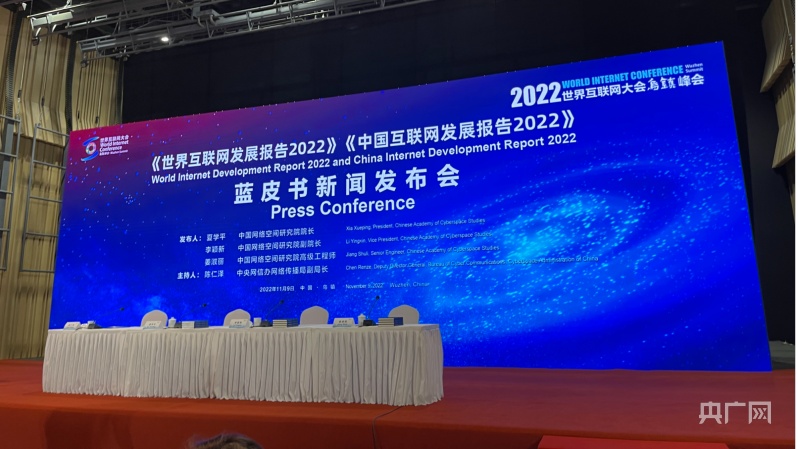World Internet Conference Blue Book: Digital Economy Helps Global Economic Recovery Digital Market Supervision Is Increasingly Strengthened
CNR, Jiaxing, November 10 (Reporter Yang Liuqing and Zhang Shengqi) The Blue Books “World Internet Development Report 2022″ and “China Internet Development Report 2022” were released on November 9 at the Wuzhen Summit of the 2022 World Internet Conference.
(Photo by Zhang Shengqi, a reporter from China Central Radio Network at the press conference)
The “World Internet Development Report 2022″ summarizes the development of the Internet in the world, and objectively reflects the new measures and progress of Internet construction in various countries.
First, the information infrastructure was optimized and upgraded, and the commercial deployment of satellite Internet was accelerated. The global communication network infrastructure has entered a stage of accelerating and upgrading, the construction of computing power infrastructure has continued to increase, and the construction of application infrastructure such as the Internet of Things, Industrial Internet, and Internet of Vehicles has accelerated. Countries are actively deploying satellite Internet development, accelerating research on satellite Internet technology standards, and active innovation in satellite application technology.
Second, the development of digital technology has entered the fast lane, and the application scenarios of artificial intelligence technology have expanded. The global information technology industry is advancing steadily, innovations in basic information technologies such as high-performance computing, integrated circuits, and software technologies are accelerating, cutting-edge scientific and technological achievements continue to expand the frontier of human knowledge, and new technologies such as artificial intelligence and quantum information are being applied at a faster pace.
Third, the digital economy has helped the global economic recovery, and the “digital divide” between regions has widened. In 2021, the added value of the digital economy in 47 countries around the world will reach US$38.1 trillion, a year-on-year nominal increase of 15.6%, accounting for 45.0% of GDP. At the same time, the head effect of the digital economy is still obvious, and the gap in the development level and scale of the digital economy between regions continues to widen.
Fourth, the level of digital government construction has improved, and the gap between countries is obvious. Countries around the world have continued to improve in terms of infrastructure construction, public data opening, online service levels, and digital government leadership. The overall e-government architecture in major countries and regions has been basically completed, and the government has gradually transformed into a full-process integrated government service.
Fifth, the diversified development of Internet media, social media has become the main battlefield of public opinion. Driven by digital technology, the world is facing an all-round political, economic and social transformation, and the Internet media industry has entered a new era of development. Mainstream news media is still the most trusted information acquisition channel, but “social media logic” has been deeply “embedded” and “implanted” in news production and the diffusion and flow of public information, and social media admission has become an important part of the news industry.” player”.
Sixth, network security loopholes are frequent, and network attack and defense confrontation is intensified. Global network security threats are escalating. Advanced persistent threats (APT), ransomware, high-risk vulnerabilities, distributed denial of service (DDoS), phishing, phishing, email attacks and other network threats and risks are still prominent, and cloud computing security protection remains Weakness, cyber attacks for the Internet of Vehicles are on the rise. There are frequent cybersecurity threat incidents targeting key industries, new technologies, and new scenarios, and cyberattack participants have lower barriers to entry and more aggressive attack methods. The network security protection is transformed to zero trust security, and the zero trust architecture has entered a critical period of development. Global APT attacks are still active, and key industries have become hot targets.
Seventh, the process of network legislation has been accelerated, and digital market supervision has been increasingly strengthened. The increase in the weight of the digital economy has put forward new requirements for market supervision, and the issue of data security has attracted much attention. Countries are actively establishing and improving policies, laws and regulations, strengthening emerging legislation in the digital age, creating a better atmosphere for technological innovation, and strengthening laws around digital economy and market legislation. institutional supply.
Eighth, international competition in cyberspace has intensified. The governance deficit, trust deficit, peace deficit, and development deficit in the international community are becoming increasingly prominent. Major countries and regions have competed and cooperated on issues such as cross-border data governance, artificial intelligence governance, digital currency, digital market regulation, and cybersecurity.
The World Internet Development Report 2022 has made an objective and accurate assessment of the Internet development in 48 countries and regions around the world. The top ten countries this year are the United States, China, Germany, Sweden, the Netherlands, South Korea, the United Kingdom, Canada, and Finland. ,Denmark.
